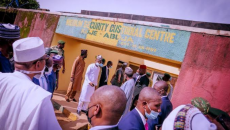From 400,000 fixed lines in 2001 to 134 million in 2014, telecoms has become the game changer in Nigeria
 The telecommunications revolution dates back to 2001 when the first auction for GSM licences was held in Nigeria by the Nigeria Communications Commission, NCC. The commission was set up by Decree 75 of 1992 while the first board of the commission was established in 1993. It lasted only one year before it was dissolved by the then military government in 1994. There was no other board until Olusegun Obasanjo became president in 1999. Without the board, the commission was a lame duck and made no progress as everything the commission does is by delegated authority from the board.
The telecommunications revolution dates back to 2001 when the first auction for GSM licences was held in Nigeria by the Nigeria Communications Commission, NCC. The commission was set up by Decree 75 of 1992 while the first board of the commission was established in 1993. It lasted only one year before it was dissolved by the then military government in 1994. There was no other board until Olusegun Obasanjo became president in 1999. Without the board, the commission was a lame duck and made no progress as everything the commission does is by delegated authority from the board.
When the civilian government returned in 1999, one priority area was telecommunication. The government needed to liberalise the telecoms sector where NITEL enjoyed an unproductive monopoly by introducing new technologies. The reform began with a policy shift that broke NITEL’s monopoly and increased capacity utilisation through competition and innovation, and also to attract foreign direct investment, FDI.
The new telecoms policy released in 2000, granted full liberalisation to the sector. To attract the needed FDI, it removed the ceiling on foreign equity participation to allow unhindered inflow of foreign investment. The policy reduced the import duty on telecoms equipment from 25 per cent to five per cent for the first two years. Furthermore, bottlenecks were removed from the procedure for the importation of telecoms materials. The development of related software was equally simplified and some fiscal incentives were given to encourage local manufacture of telecoms hardware and software. To cap it all, the policy granted pioneer status to the initial investors that enabled them to recoup their investment before the issuance of new licences.
Obasanjo showed government’s seriousness by making the NCC board one of the first boards he constituted on April 3, 2000. The new board of the commission was inaugurated by Atiku Abubakar, then vice president. That was the birth of the new commission, the second board of the commission.
The first chief executive of the commission was Engineer Romantu and during his tenure investors shunned Nigeria because it was not an open market and because of the military government. The absence of a board also affected his operations.
In 1999, Romantu was replaced by Dr Emmanuel Chukwuma Nnama whose regime lasted only six months. He was replaced by Ernest Ndukwe. To make the new management work, a new board was immediately appointed. It was led by Ahmed Joda as chairman. The government mandated the board to create the right environment for the improvement of telecom services in Nigeria “urgently and drastically.”
The second board and the management laid the foundation for the telecoms revolution by building a regulatory institution that has international recognition and respect; making telecoms services common in Nigeria and making it work for the people.
At independence in 1960, Nigeria had only 20,000 fixed lines. After over 40 years of independence, government could only grow this to 400,000 lines in 2001, including just over 20,000 analogue mobile lines in Nigeria. Then, Nigeria had the third lowest teledensity in the world (number of telephone lines in relation to the population), after Mongolia and Afghanistan. After the first decade of the evolution and the end of Ndukwe’s tenure in 2010, Nigeria had 88.3 million lines, most of which were mobile lines. The teledensity had also galloped to 63.1 per cent as against less than one per cent in 2000. Before 2000, attempts had been made to liberalise telecoms in Nigeria but they failed. Some GSM licences had been issued to over 20 companies in the 90s but they didn’t use them.
Giving an insight into the success of the telecoms sector, Ndukwe explained the most important thing was access: “Sometimes things work not because you want to make profit. If you want telecoms services, it’s not because you want profit but because you need communications for yourself. That is why government liberalised. Government did not liberalise in other to make telecoms companies rich, no! We didn’t liberalise because we wanted new businessmen to come into Nigeria, no! The only reason why we liberalised was to allow the ordinary Nigerian have that important tool of engagement that makes one a global citizen and a member of the new world economic order.”
Before the issuance of the GSM licences many private telecommunications operators, PTOs, were licensed to provide telephone services. Multilinks, Starcomms, Reltel and Intercellular were the PTOs that started before the GSM companies. There were also long distance operators like Siemens, Suburban, Phase3, 21st Century, Swift Networks and many others.
In 2000 the commission hired international consultants to determine the reserved price of the GSM licences – the minimum worth of the frequency. The auction started on February 17 and ended on February 19, 2001. The commission targeted $100 million for the licences but to its surprise, at the end of the day they got $285 million, showing that “the market values it more.”
Four GSM companies were licenced by NCC: ECONET Wireless (now Airtel), 0802; MTN 0803; MTEL 0804; and Globacom 0805. In addition to the GSM licence, Globacom got an additional licence as the second national carrier, after NITEL. At the initial roll out in 2001, calls were made at N50 a minute. By 2010 it had gone down to as low as N15 a minute. Interconnectivity was also an initial challenge but NCC made sure all the service providers interconnected for the benefit of subscribers. Today economy of scale has eventually led to lesser prices.
Globacom announced its entry into the GSM market by being the first to operate per second billing. Prior to this, there was subscriber outcry against dropped calls, which were charged as a full minute, even after only two seconds. Soon after, the other service providers joined to remain competitive. Unfortunately, MTEL, the national carrier fell by the wayside and its GSM 0804 portal went off the air. This was a big disappointment to subscribers who looked unto MTEL as the national carrier to moderate the call tariffs by charging the lowest price.
The last entrant into the GSM market was Emerging Markets Telecommunication Services (EMTS), trading as Etisalat. It acquired the Unified Access Licence from NCC in January 2007, which includes a mobile licence and spectrum in the GSM 1800 and 900 MHz bands. Etisalat made the first official call on its network on March 13, 2008 and it began commercial operations in September 2008. Like Globacom it brought a unique innovation to announce its arrival. The company floated the “0809uchoose” campaign, which enabled Nigerians to choose numbers special to them as their mobile numbers. It began full commercial operations in October 2008. It became known by its market slogan, 0809ja, to emphasize its Nigerianness.
In 2010, the current board of NCC was set up with Peter Igoh as chairman and Dr Eugene Juwah as executive vice chairman and chief executive officer. There are seven other members, two of whom are executive commissioners. It fell on their shoulders to continue the evolution of the telecom revolution.
By the end of 2014 the subscriber base has more than doubled and the teledensity had grown to over 96 percent. Government has achieved its desire to give Nigerians access to telephones and attention has shifted to broadband to deepen the experience.
Follow Us on Social Media



 WhatsApp us
WhatsApp us